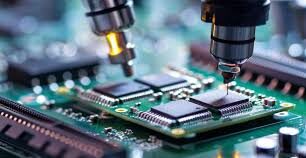Oman Attracts Global Investments in Semiconductors and Electric Vehicles
In a strategic move to establish itself as a leader in cutting-edge technologies, Oman has successfully drawn significant global investments in the semiconductor and electric vehicle (EV) industries. These initiatives align with the nation’s Oman Vision 2040, a long-term development strategy aimed at diversifying the economy, fostering technological innovation, and enhancing industrial capabilities.
Oman’s Semiconductor Industry Initiatives
The semiconductor industry is a key focus for Oman as it seeks to become a prominent player in global technology supply chains. On February 17, 2025, the Ministry of Transport, Communications, and Information Technology (MTCIT) signed a Memorandum of Understanding (MoU) with AONH Private Holdings. This collaboration aims to develop advanced artificial intelligence (AI) semiconductor chips at the Salalah Free Zone in the Dhofar Governorate. The production facility will focus on manufacturing high-performance AI chips used in autonomous vehicles, AI training systems, and data processing applications.
Dr. Ali Amir Al Shidhani, Undersecretary for Communications and Information Technology, emphasized that this initiative is part of the Digital Industry Program under the National Digital Economy Program. He stated that the project will help Oman establish a global presence in semiconductor design and advanced packaging technologies, making it an attractive destination for international semiconductor companies. The initiative is expected to stimulate local innovation, create high-value job opportunities, and contribute to long-term economic sustainability.
In addition to the partnership with AONH, the Oman Investment Authority (OIA) has been actively expanding its reach in the semiconductor sector. In March 2024, OIA signed a Memorandum of Cooperation with Japan to explore investment opportunities in semiconductor technologies. This strategic partnership aims to transfer advanced manufacturing technologies to Oman, strengthening its industrial ecosystem and creating skilled job opportunities for the local workforce.
Mulham Al Jarf, Deputy Chairman for Investments at OIA, highlighted Japan’s global reputation in semiconductor technology, expressing confidence that this collaboration will boost Oman’s capabilities in chip design and manufacturing.
Additionally, in February 2024, OIA’s subsidiary, ITHCA Group, made a notable investment in the U.S.-based semiconductor design company GSME. This investment resulted in the successful development of two test chips, Oman-1 and Oman-2, which were entirely designed by Omani engineers. The achievement underscores Oman’s commitment to fostering local talent and becoming a key contributor to the global semiconductor industry.
Electric Vehicle Sector Developments
Beyond semiconductors, Oman is also making significant strides in the electric vehicle (EV) industry, aligning with global trends toward sustainable transportation. On February 26, 2025, Qais Mohammed Al Yousef, Minister of Commerce, Industry, and Investment Promotion, met with senior representatives from Jetour Global, a leading Chinese EV manufacturer. The discussions focused on localizing advanced EV production in Oman and strengthening its position as an industrial and technological hub in the region.

Jetour Global has announced plans to invest approximately OMR 6.9 billion (USD 18 billion) into Oman’s EV sector. This ambitious investment aims to develop an advanced EV manufacturing facility, with the potential to create around 10,000 jobs. The project is expected to be completed within two years, significantly enhancing Oman’s industrial output and economic growth.
The planned investment reflects Oman’s commitment to becoming a competitive player in the global EV market, which is experiencing rapid growth due to increasing demand for sustainable mobility solutions. As countries worldwide push for green energy adoption, Oman’s proactive engagement in this sector could position it as a leading regional hub for EV production, battery technology, and supply chain solutions.
Educational and Training Collaborations
Recognizing the importance of a skilled workforce to sustain these high-tech industries, Oman is actively working to develop local talent. In May 2024, the University of Nizwa partnered with GS Microelectronics U.S. Inc. (GSME) to establish Nizwa Advanced Technology, a company based in Muscat that specializes in semiconductor solutions and technical training programs.
This initiative is designed to bridge the skill gap by providing hands-on training in semiconductor design, fabrication, and testing. By reducing dependence on foreign training programs, Oman aims to build a highly skilled local workforce capable of driving innovation in semiconductors and related industries.
Additionally, the government is working closely with international technology companies and academic institutions to create specialized training programs in artificial intelligence, robotics, and digital manufacturing. These efforts are expected to enhance Oman’s human capital and attract more foreign investments in advanced industries.
Strategic Implications for Oman’s Economy
Oman’s commitment to semiconductors and electric vehicles reflects a bold, forward-thinking economic strategy aimed at reducing its reliance on oil and gas revenues. By investing in high-growth industries, the country is not only diversifying its economy but also preparing for the global technological shift toward AI, automation, and digital transformation.
The global semiconductor market is projected to reach USD 1 trillion by 2030, driven by increasing demand for AI, the Internet of Things (IoT), 5G networks, and autonomous vehicles. Oman’s strategic focus on semiconductors positions it as a strong competitor in this high-value industry. Similarly, the electric vehicle sector is experiencing massive growth, with governments worldwide promoting sustainable mobility solutions. By capitalizing on these trends, Oman is establishing itself as a key player in future-oriented industries.
These strategic investments are expected to:
- Create thousands of high-value jobs for Omani professionals in engineering, AI, and digital manufacturing.
- Attract leading global technology firms to set up operations in Oman.
- Boost Oman’s GDP by expanding its advanced technology and manufacturing sectors.
- Strengthen local R&D capabilities, reducing reliance on foreign expertise.
In conclusion, Oman’s strategic partnerships, large-scale investments, and commitment to workforce development are paving the way for it to emerge as a global hub for semiconductors and electric vehicles. These developments align with Oman Vision 2040, which emphasizes economic diversification, technological progress, and sustainable development.
Do follow gulf magazine on Instagram
for more information click here


